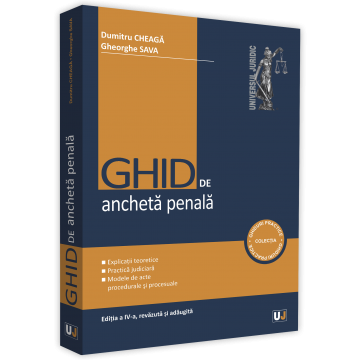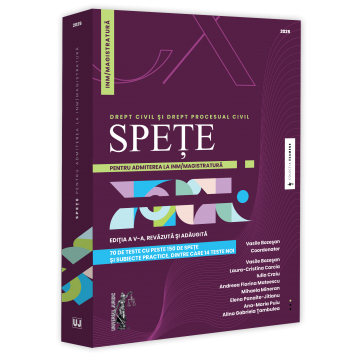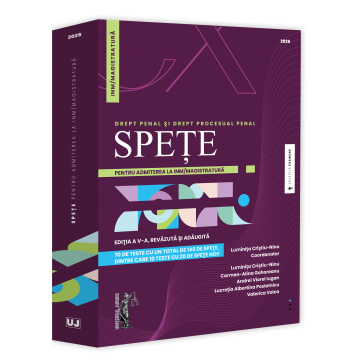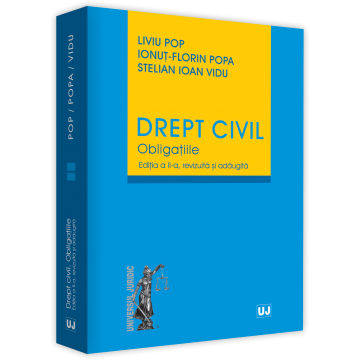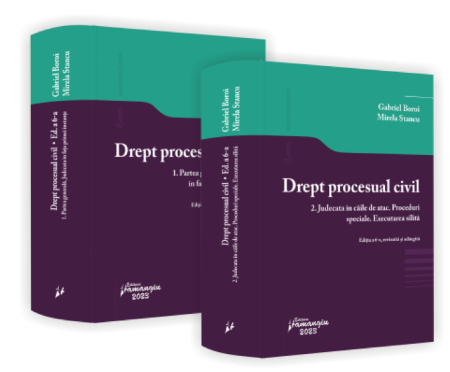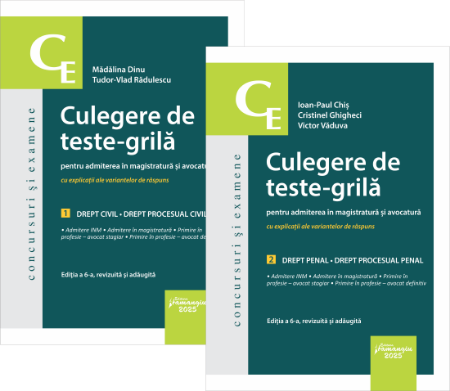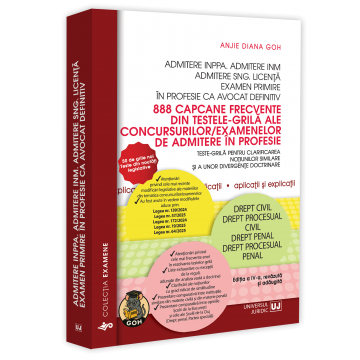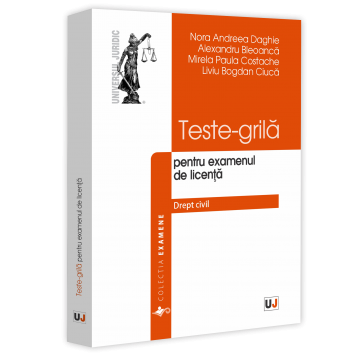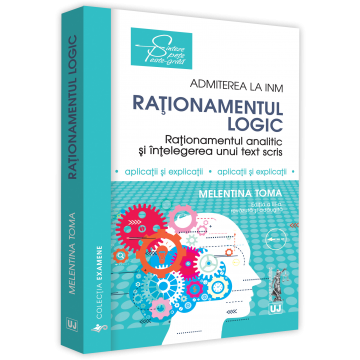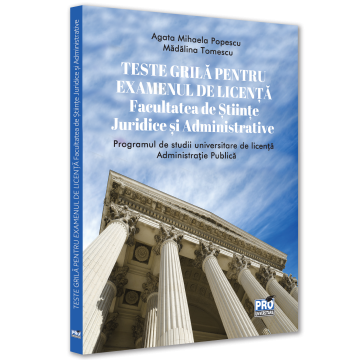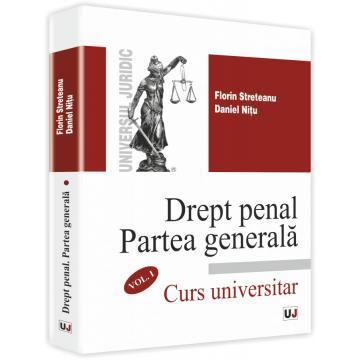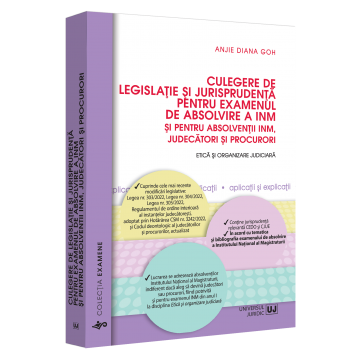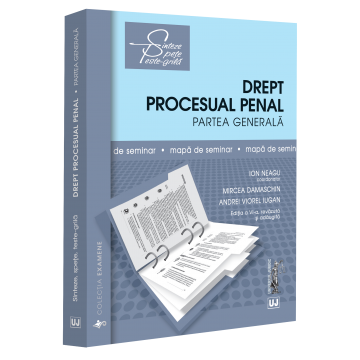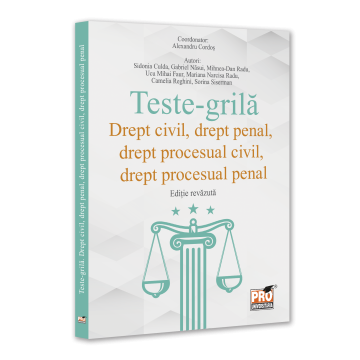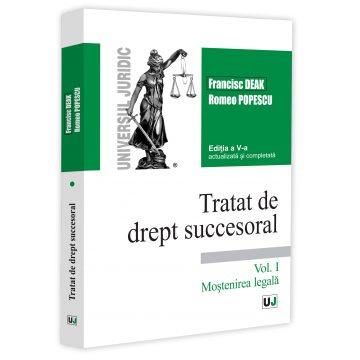ISBN: 978-606-591-796-5
DOI: 10.5682/9786065917965
Publisher year: 2013
Edition: I
Pages: 245
Publisher: Editura Universitară
Author: Dragos Calin
- Description
- Download (1)
- Authors
- Content
- More details
- Reviews (0)
The three volumes [Relevant decisions of the Constitutional Court in the matter of judicial organization, Relevant decisions of the Constitutional Court in the matter of the status of judges and prosecutors, Relevant decisions of the Constitutional Court in the matter of other legal professions (lawyers, notaries, legal advisers, bailiffs, media, staff auxiliary specialized courts and prosecutors' offices attached to them)] together for the first time together jurisprudence constitutional court with reference to the judicial organization and status of the legal profession.
Staff magistrates aims to ensure competence, independence and impartiality which legitimately anyone expects from the courts and from every judge to whom is entrusted the protection of their rights , and prosecutors stability . Meanwhile, the judiciary ensure independent courts and judges , requisite to the rule of law and a fundamental guarantee of a fair trial, the judiciary is one of the three pillars , equally important , of the rule of law, with legislative and executive . It must be independent in relation to society in general , and the parties to any dispute on the judges must decide . In addition , the legal profession is governed by the rules established by law in order to ensure a qualified legal aid those who wish to practice this profession are bound to obey the law and accept the rules imposed by it.
One such project is extremely useful for all legal professions , through the information provided , following on all fights and solutions Constitutional Court, the rule of law and the coordinates of the right to a fair trial, one of the principle components to ensure the rule of law in a democratic society.
The selection was made by Dragos Calin , Judge , Court of Appeals, the project is supported by the Association of Judges Forum in Romania .
-
Relevant decisions of the Constitutional Court in the matter of other legal professions
Download
Judge at the Bucharest Court of Appeal, trainer of the National Institute of Magistracy for continuous professional training European Union law, international judicial cooperation in civil and commercial matters, labor law and social insurance law; associate scientific researcher of the Institute of Legal Research of the Romanian Academy - Center for European Law Studies, director of the Journal of the Judges Forum, member of the scientific college of the journal Jurisclasor ECHR, co-editor of the Journal iaduer.ro - European Legal Affairs, founding member and co-president Romanian Judges Forum Association (2007-present), member of the GEMME Europe Board of Directors (May 2010-present), vice-president of GEMME Europe - European Grouping of Magistrates for Mediation (May 2010-May 2012), founding member of CIMJ International Conference on Mediation for Justice), October 2009, Paris
do not contradict in any way the provisions of the Constitution / 13
2. The so-called transformation of a legal function into a profession (that of lawyer) does not contradict the constitutional texts invoked, namely art.32 (which enshrines the right to education), art.38 (concerning labor and social protection of labor ), art.49 (restriction of the exercise of certain rights or freedoms), art.51 (observance of the Constitution and the laws), art.54 (exercise of rights and freedoms) / 25
3. The fact that the law gives the possibility to regulate by statute some aspects related to the organization of the legal profession is not likely to attract the unconstitutionality of the criticized legal provisions. The concordance between the law and a normative act with inferior legal force, adopted on the basis of it, is a matter of application of the law, and not of unconstitutionality, being within the competence of the court / 29
4. The right to work provided by art. 41 of the Constitution is not related to the measure of suspension from office of a lawyer in case of non-fulfillment of some obligations provided by law, because art. 1 paragraph (1) of Law no. 51/1995 provides, regarding the professional category whose activity regulates it, that “The profession of lawyer is free and independent, with autonomous organization and functioning, under the conditions of the present law and of the statute of the profession” / 31
5. Art. 1 of Law no. 51/1995 provides for the liberal and independent character of the legal profession, and art. . This option of the legislator cannot be considered unconstitutional, given that its purpose is to provide qualified legal aid, and the rules under which it operates do not contravene constitutional principles ", those who want to practice this profession being obliged to comply with the law and accepts the rules imposed by it / 35
6. No consideration regarding individual freedom, implicitly the one of association, can be retained for the removal of art. 1 paragraph 2 of Law no. 51/1995, which provides that the profession of lawyer is exercised only by the members of the bar / 37
7. The regulation by the legislator, through special norms, of the organization and exercise of the legal profession does not have the meaning of a prohibition for another professional category, respectively that of legal advisers, to carry out specific professional activities, also provided in a special law - Law no. 514/2003, published in the Official Gazette of Romania, Part I, no. 867 of December 5, 2003, and, at the same time, is not likely to create discrimination or unfair competition between the persons exercising the two professions / 39
8. The completion of Law no. 51/1995 for the organization and exercise of the legal profession was made after studying the similar legislation from the other European states, of the other legal provisions in the field of human rights and labor law. It cannot be stated that the law would allow the practice of law by persons who do not have the quality of lawyer. The fact that the author of the exception had established, in 1991, under Law no. 31/1990 on commercial companies, republished, with subsequent amendments, a company whose object was, among others, the provision of legal advice, does not absolve him of liability for non-compliance. Law no. 51/1995/44
9. The criticized legal provisions are in accordance with the provisions of art. 9 of the Fundamental Law, which stipulate that “professional associations are established and carry out their activity [...] in accordance with the law”. Or, the special law under which the bars acquire legal personality is precisely the Law no. 51/1995 for the organization and exercise of the legal profession / 49
10. The fact that, in order to exercise a profession, be it liberal, the obligation to pass an examination is established does not imply, in any form, the affectation of the free development of the human personality, as a constitutional principle inscribed in art. 1 paragraph (3) of Constitution. This verification is a natural way to know the degree of professionalism of a candidate for a certain position, in order to exercise it optimally. The simple graduation of a higher education institution represents only the certification of a vocation for the occupation of the respective position / 51
11. The request of the author of the exception to interpret the provisions of art.14 paragraph (2) letter c) of Law no. 51/1995, in the sense of equivalence of the exam held for the occupation of another legal position, concerns, in reality, a legislative omission, which, however, cannot be resolved by the Constitutional Court, because it cannot replace the positive legislator / 53
12. Although the establishment of conditions for admission to the legal profession is the option of the legislator, such conditions cannot be imposed in order to discriminate against a certain category of persons - persons already retired for old age or those under 5 years until reaching the retirement age - in relation to the other categories of persons, without any rational and objective justification / 55
13. The legislator has full competence to regulate the conditions to be met for access to certain professions, so that the lack in the enumeration contained in the criticized text of the law of the bailiff profession is a manifestation of his sovereign option, which does not raise constitutionality / 58
14. Regarding the criticism regarding the violation of the right to defense is not founded, because, through the text of art. 19 of Law no. 51/1995, this right is not violated, it being a guarantee of a performance corresponding to the different degree of difficulty of the cases. in the role of the superior courts, which imposes, besides the theoretical knowledge acquired in the faculty, also practical knowledge, accumulated only through a certain seniority in the exercise of the profession of lawyer / 61
15. Art.20 paragraph (1) of Law no.51 / 1995 does not establish restrictions on the exercise of the right to practice law, but incompatibilities in the exercise of the profession of lawyer at court or at the prosecutor's office where the husband, relative or brother-in-law until the third degree inclusive fulfills the function of magistrate. These incompatibilities constitute protection measures for the parties against suspicions regarding situations likely to alter the act of justice / 64
16. The restriction of the right to work of lawyers who were judges by the interdiction to draw conclusions in the courts where they worked is temporary, lasting only for a limited period of time, and is applicable only to the court where the lawyer worked. as a judge / 68
17. Art.20 paragraph (8) first sentence of Law no.51 / 1995, which prohibits lawyers who were judges to draw conclusions in the courts where they functioned, for 5 years from the termination of this position, operates a restriction of the right to defense enshrined in Article 24 of the Constitution, but does not affect the substance of the right to defense / 72
18. Prohibition of the right of lawyers to plead in the courts and prosecutor's offices where the husband or relatives or relatives in law function as judges, respectively prosecutors does not find a reasonable justification in relation to the interest of the defense, as long as the corresponding provisions of the codes of civil and criminal procedure / 76
19. The suspension of the lawyer's profession for total or partial non-payment of professional fees and contributions is a proportionate sanction in relation to the purpose pursued, namely the execution of the lawyer's professional obligations. Such a sanction has, practically, the effect of forcing the suspended lawyer to pay his professional fees and contributions in order to be able to resume his legal activity / 87
20. The existence of a separate regulation on the legal protection of legal practitioners, which excludes the application of a general legal regime other than that specific to the profession in question, and even less a legal regime applicable to another professional category, in relation to which , through an express legal provision, it is established that lawyers are not assimilated with civil servants, they do not violate the constitutional principle of equality in rights / 89
21. The registration in the bar associations or in the chambers of notaries public constitutes a legal condition in order to be able to exercise the profession of lawyer or that of notary public. Therefore, it is not the practicing lawyer or notary public who is obliged to join the association, but the quality of member of the association conditions the practice of the profession / 93
22. The task of the bar council to compile, modify and publish the annual list of lawyers, members of the bar, and to communicate it to those in law does not violate the provisions of art.41 of the Constitution and those of art.6 of the Convention for the Protection of Human Rights and Fundamental Freedoms / 98
23. The establishment, in connection with the exercise of the profession of lawyer, of an administrative jurisdiction and of its specific remedies, does not remove the possibility of those interested to address the courts, either directly - taking into account the provisions of art.21 par (4) of the Romanian Constitution, republished, in accordance with chas special administrative jurisdictions are optional - either after completing a special step or after exhausting all remedies established within the specific jurisdictions of the legal profession / 101
24. The legislator, based on his constitutional competence, provided that the nullity of the company registered in the trade register can be declared only for the irregularities expressly provided by law, respectively if the object of activity of the company is illegal or contrary to public order. The company ceases without retroactive effect and enters into liquidation on the date on which the court decision declaring the nullity became irrevocable / 105
25. The statute of the legal profession was adopted, based on art. 63 of Law no. 51/1995, by the Council of the Lawyers' Union, without this contradicting the invoked constitutional provisions. This option of the legislator cannot be considered unconstitutional, considering that its purpose is to ensure a qualified legal assistant, and the norms based on which it works do not contradict the constitutional principles. The fact that access to the legal profession is conditioned by the satisfaction of certain requirements cannot be regarded as an restriction on the right to work or the free choice of profession / 109
26. Given that the legal profession is a public service and not a public authority, it is not limited to the judiciary and, as a result, its legal regulation, according to the legislator's option, cannot be qualified as a violation of the principle of separation of powers / 112
27. The right of association can be exercised only in compliance with the law, and not against it, so that neither this right, specific by its nature to the liberal professions, nor the provisions contained in art. 40 of the Constitution are disregarded by art. 82 of Law no. .51 / 1995 for the organization and functioning of the legal profession, as amended by Law no. 255/2004/116
28. In connection with the lawyer's right to pension and other social security rights, the O.U.G. no. 221/2000, approved with modifications and completions by Law no. 452/2001, provides that it is exercised through a unique, own and autonomous system that is organized and operates based on the principles of autonomy, solidarity, obligation, contributivity, decentralization and of the distribution, under the conditions provided by Law no. 51/1995, republished, and by the Statute of the Lawyers' Insurance House. This system is managed by the Romanian Bar Insurance House, as an autonomous institution of public interest with legal personality, with organization and functioning status approved by the Council of the Romanian Bar Union / 118
29. In the preamble of O.U.G no. 159/2008, the urgency character is determined by the opportunity, the reason and the utility of the regulation, without highlighting the existence of an extraordinary situation whose regulation cannot be postponed. Deficiencies in the motivation of such a situation impose the conclusion that the adoption of the regulation in question, by way of an emergency ordinance, does not meet the requirements imposed by the mentioned constitutional text / 122
The three volumes [Relevant decisions of the Constitutional Court in the matter of judicial organization, Relevant decisions of the Constitutional Court in the matter of the status of judges and prosecutors, Relevant decisions of the Constitutional Court in the matter of other legal professions (lawyers, notaries, legal advisers, bailiffs, media, staff auxiliary specialized courts and prosecutors' offices attached to them)] together for the first time together jurisprudence constitutional court with reference to the judicial organization and status of the legal profession.
Staff magistrates aims to ensure competence, independence and impartiality which legitimately anyone expects from the courts and from every judge to whom is entrusted the protection of their rights , and prosecutors stability . Meanwhile, the judiciary ensure independent courts and judges , requisite to the rule of law and a fundamental guarantee of a fair trial, the judiciary is one of the three pillars , equally important , of the rule of law, with legislative and executive . It must be independent in relation to society in general , and the parties to any dispute on the judges must decide . In addition , the legal profession is governed by the rules established by law in order to ensure a qualified legal aid those who wish to practice this profession are bound to obey the law and accept the rules imposed by it.
One such project is extremely useful for all legal professions , through the information provided , following on all fights and solutions Constitutional Court, the rule of law and the coordinates of the right to a fair trial, one of the principle components to ensure the rule of law in a democratic society.
The selection was made by Dragos Calin , Judge , Court of Appeals, the project is supported by the Association of Judges Forum in Romania .

6359.png)
![Relevant decisions of the Constitutional Court in the matter of other legal professions [1] Relevant decisions of the Constitutional Court in the matter of other legal professions [1]](https://gomagcdn.ro/domains/editurauniversitara.ro/files/product/large/decizii-relevante-ale-curtii-constitutionale-in-materia-altor-profesii-juridice-1260-648289.jpg)
